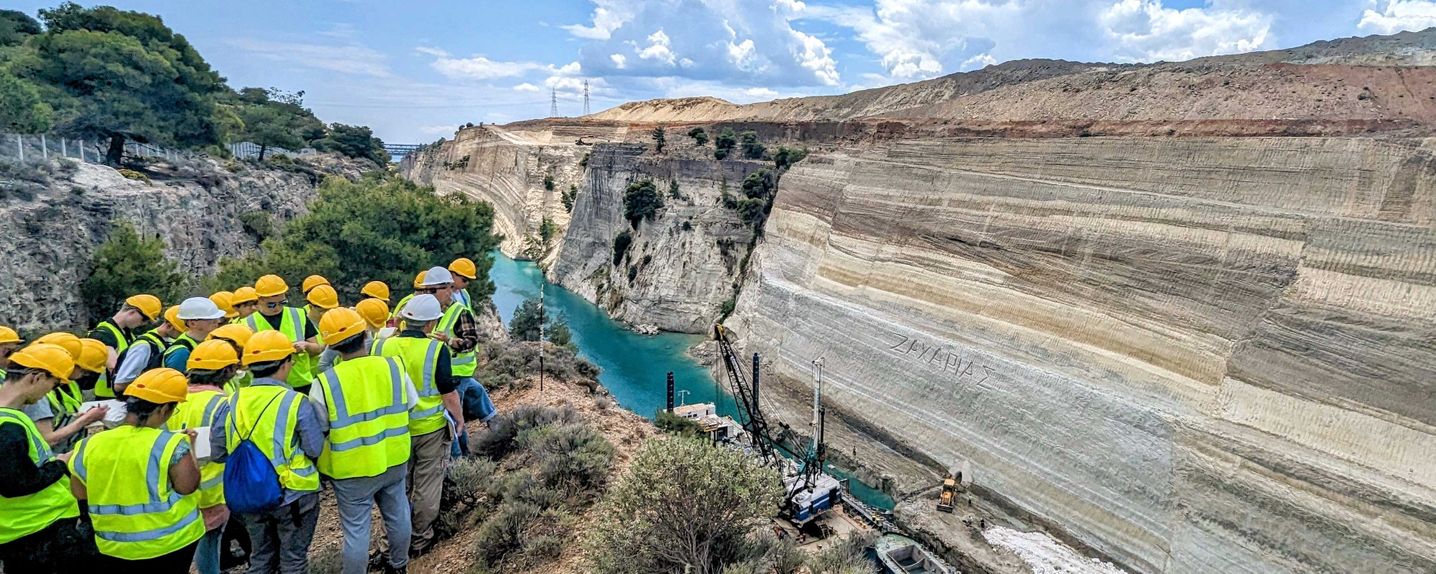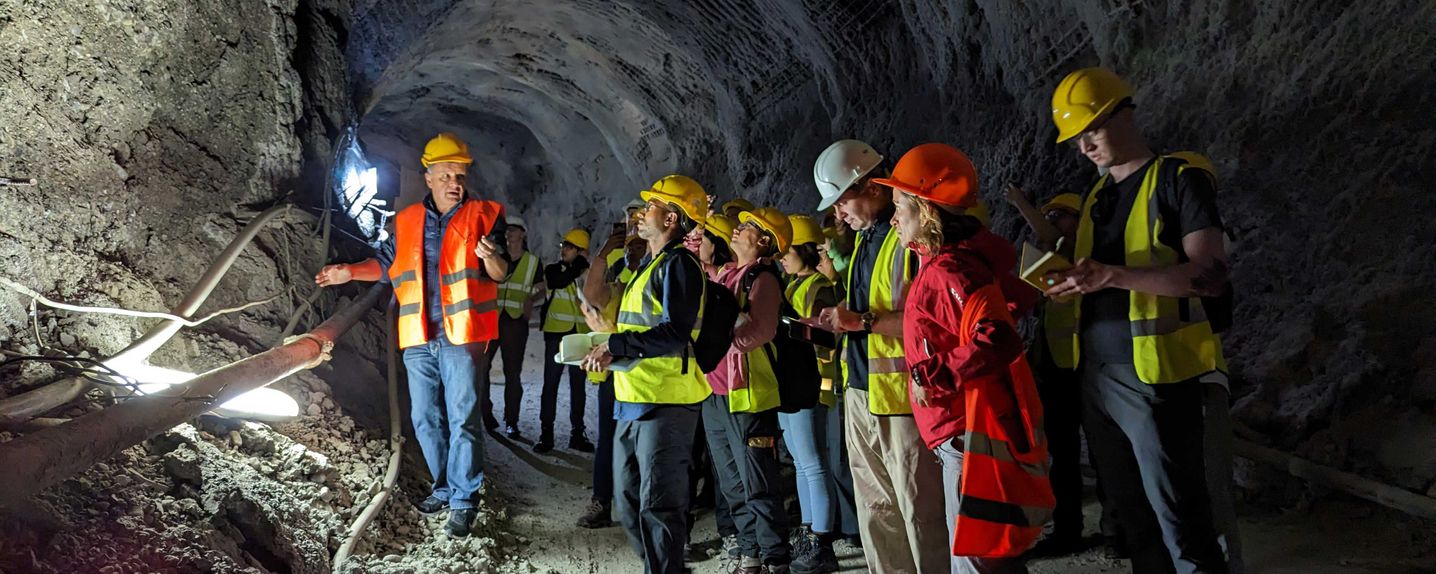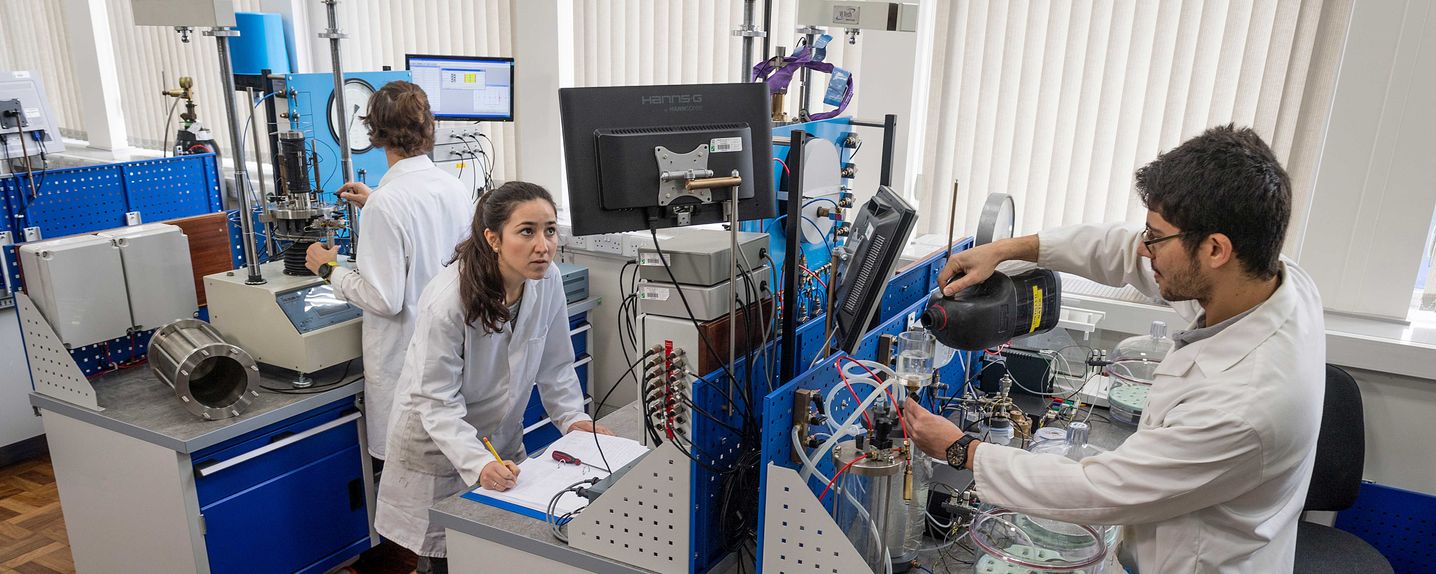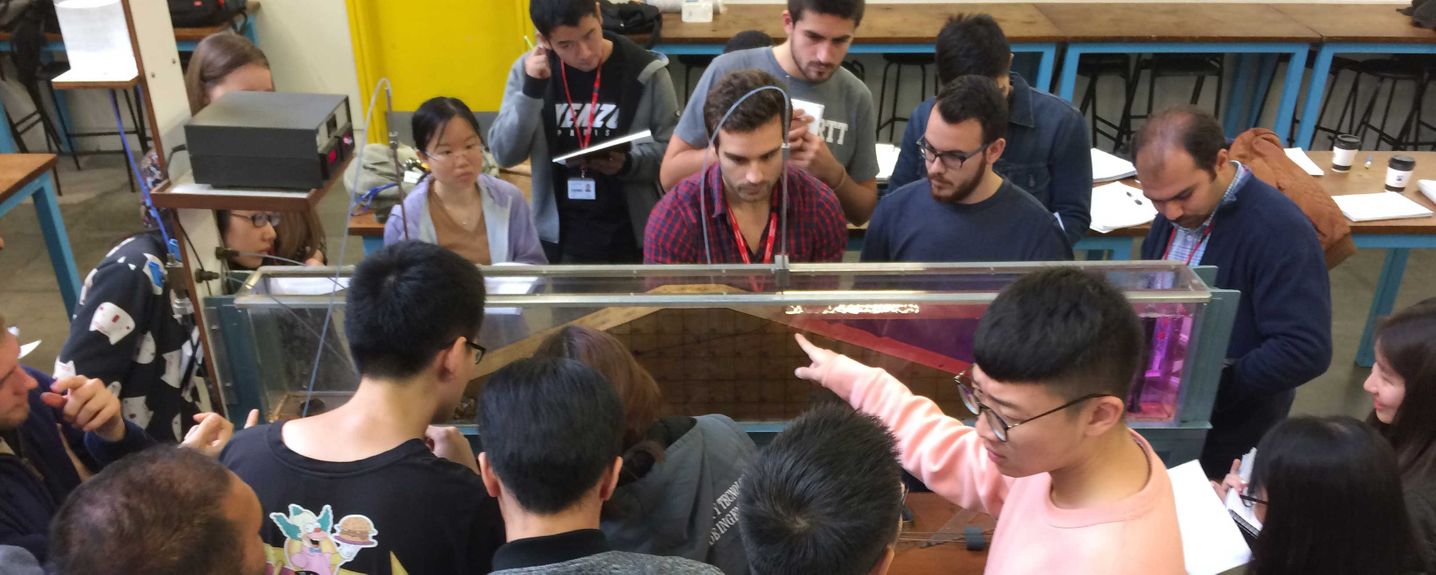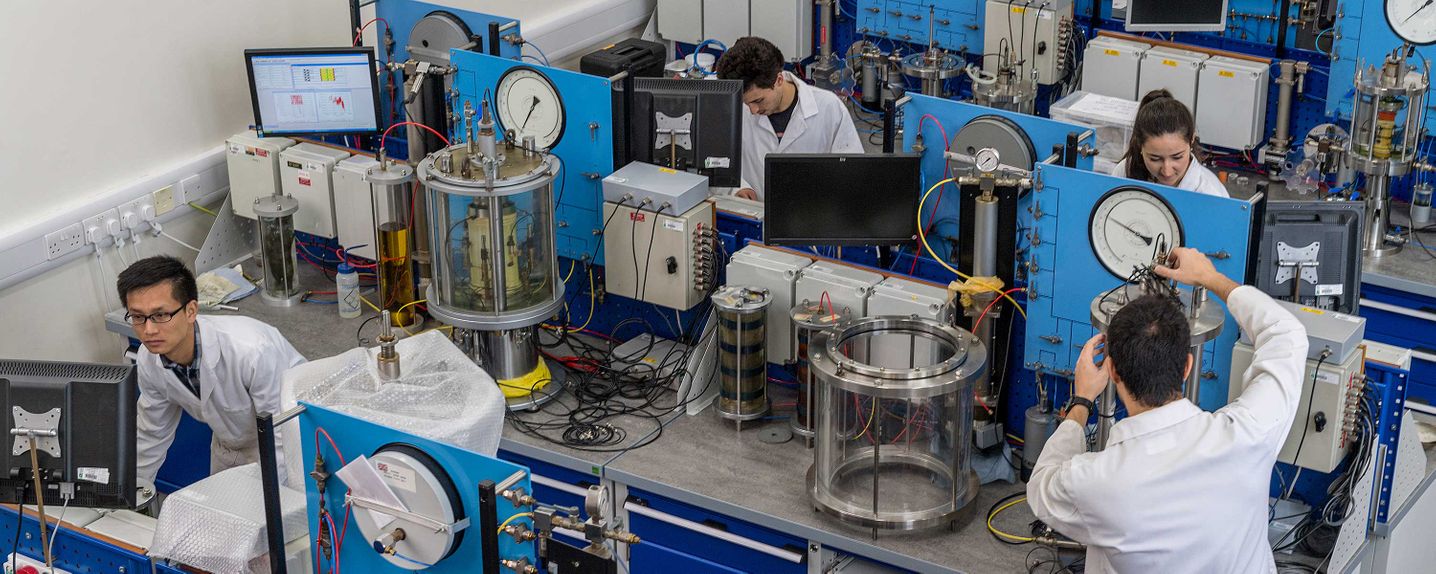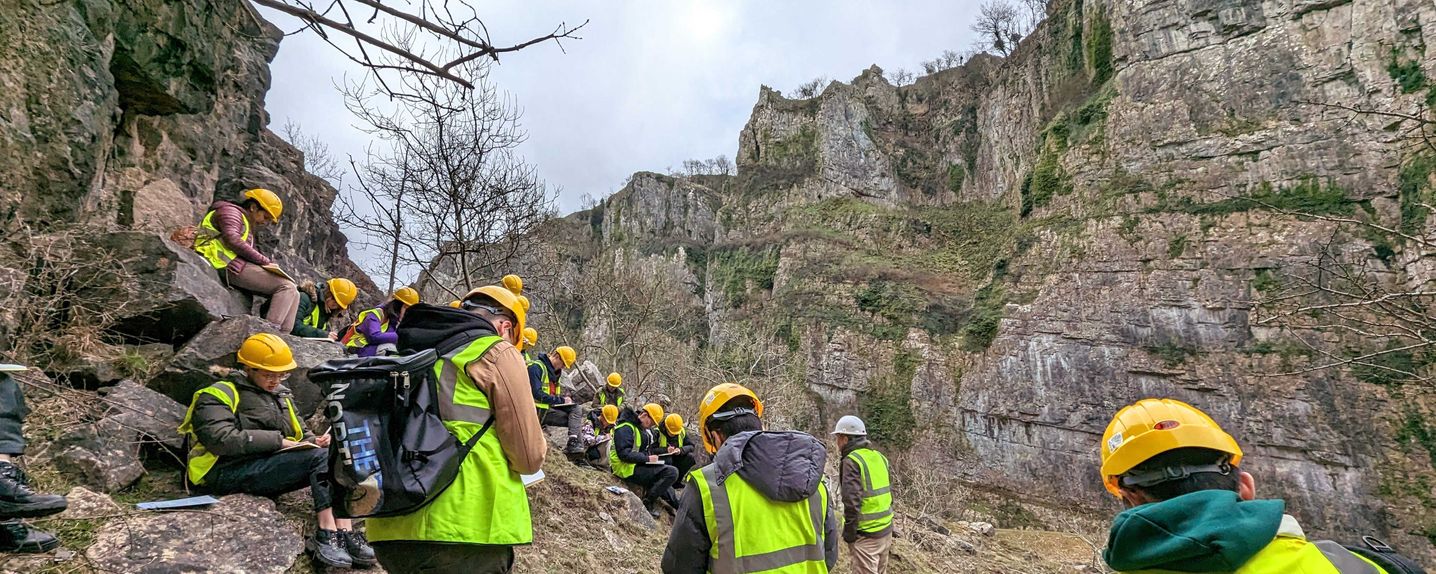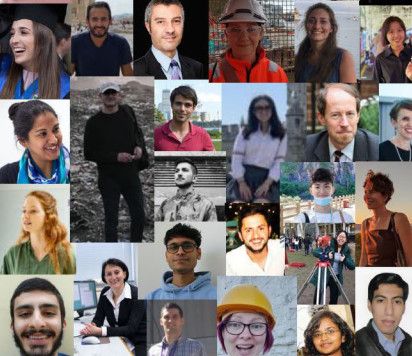The Geotechnics Section in the Department of Civil and Environmental Engineering at Imperial College London is delighted to offer a world-leading selection of specialist MSc courses in Geotechnical Engineering. Our aim is to provide students with an understanding of the mechanics, behaviour and properties of soils and soft rocks to enable them to contribute to applications including tunnelling, offshore wind, geothermal energy, infrastructure, and foundations to landmark building.
Our MSc in Geotechnical Engineering equips students with the fundamental skills and knowledge to enable them to work as geotechnical specialists. We also offer four MSc courses that allow students to focus on specific aspects of geotechnical engineering, these are the MSc in Geotechnical and Earthquake Engineering, the MSc in Geotechnical and Geological Engineering, the MSc Geotechnical and Geoenvironmental Engineering, and the MSc in Geotechnical Engineering with Data Science.
These are postgraduate taught courses. Each year we welcome students with bachelor’s degrees (BEng or BSc) or master’s degrees (MEng of MSc) in civil engineering, mechanical engineering, geology, geophysics, earth science, and science from all over the world.
Should I study Geotechnical Engineering?
Watch Dr Katerina Tsiampousi, the former Geotechnical Engineering MSc course director, give an overview of the MSc course organization, explain the course options, introduce our facilities, teaching and assessment approaches, highlight available scholarship opportunities, and outline post-graduation opportunities.
Unique features of our MSc programme
- Students can participate in a comprehensive series of specialist post-graduate modules and complete their own master’s research project within a single academic year (12-month period).
- There are opportunities to interact with industry throughout the programme. We operate an Industrial MSc Bursary scheme, which provides competitive scholarship awards funded by industry. The participating companies hold recruiting events, deliver lectures, and often participate in social events such as our start of term reception.
- Graduates from our programme are highly regarded; in recent years some of our alumni have been awarded the British Geotechnical Association Dissertation Prize and the prestigious Cooling Prize, based on their MSc research dissertations. Our alumni pages can give you an idea of what our former students have achieved. Please also check out the videos below .
- The UK graduate visa programme allows international graduates to remain to work in the UK post graduation.
- Our staff are internationally renowned and include academics who have been invited to give the British Geotechnical Association Rankine Lecture and the Géotechnique lecture, as well as a numerous high profile international lectures. Our research pages summarize staff achievements and current research projects.
- Some students select to complete their studies over two years. These students study full time for the duration of the Autumn term in their first year. Then, they return to us again as full-time students for the Spring term of their second year.
- There are three field trips, including a fantastic one-week trip to Southern Europe each summer.
- Students can access world leading research facilities including our specialist soil mechanics laboratories, specialist geotechnical software, and the high-performance computing facilities at Imperial College London.
- The prestigious British Geotechnical Association Rankine Lecture is held on campus each year, and each year we host the annual pre-Rankine seminar. Both events provide the opportunity to hear about cutting-edge research and network with geotechnical engineers from all over the world. All without leaving the campus!
- One member of the academic staff is assigned as a personal tutor to each student. In their tutor role, staff can provide bespoke advice to each student, signpost resources in college and can act as referees to students applying for jobs post-graduation.
Intro about course and reasons
What is the programme layout?
Each MSc course comprises:
- Taught modules (including laboratory-based practicals)
- Presentations on prominent projects by industry experts
- A fieldwork module comprising 3 fieldtrips and
- A research project.
Our academic year is made up of three terms, each with a different emphasis:
- The first term has a theoretical emphasis.
- The second term is more design orientated.
- The final term is dedicated to research, so that you can really apply the knowledge you’ve gained.
Transferable skills will focus on technical writing, oral presentations and team working. These are complemented by courses offered by our graduate school. We have designed our course to be complementary and teach a wide range of the skills required by modern engineers, whilst providing you with lots of exposure to design and research.
Scroll down to find out more about each of the modules.
Who is the programme aimed at?
All students should hold previous degrees in Engineering, Science, Maths, or Geology. Applicants with a 2.1 UK Bachelor’s Degree with Honours in Earth Sciences or Civil Engineering (or a comparable qualification recognised by the College); other cognate Geoscience, Engineering, Natural Sciences and numerate disciplines are encouraged to apply. Our cohorts often include engineers with significant work experience who would like to specialise in Geotechnical Engineering. Each application will be carefully considered individually to ensure you have pre-requisite level of competence in maths, science and engineering to succeed on your chosen course. For example, we normally expect students who do not have a prior engineering qualification to have completed A-level mathematics or equivalent.
What will I learn?
The programme will teach you a wide range of key skills that you can then apply in geotechnical engineering design and analysis. The programme will cover theoretical concepts, problem solving tools, numerical methods, experimental techniques, geology, and design principles. These skills will be presented with an emphasis on Civil Engineering applications in geotechnical engineering. Networking, facilitated by our strong links with industry, along with the graduate visa that will be available to you, will provide you with opportunities to embark on the next step of your career.
Scroll down to hear from some of our former students.
Why should I study this programme?
This degree is professionally accredited by the following organisations on behalf of the Engineering Council:
- Institution of Civil Engineers (ICE)
- Institution of Structural Engineers (IStructE)
- Institute of Highway Engineers (IHE)
- The Chartered Institute of Highways and Transportation (CIHT)
- The Permanent Way Institution (PWI)
Holding an accredited degree allows you to meet the academic requirement for registration as a Chartered Engineer (CEng). Registering as a Chartered Engineer will help provide improved career prospects, status, higher earning potential. It helps demonstrate your commitment to professional standards, the engineering profession and sustainable development.
Imperial College London is one of the best Universities in the World.
Imperial College London is consistently ranked in the top 10 universities in the World and top 5 in Europe. The Department of Civil & Environmental Engineering itself is considered one of the best in the World and consistently excels in both teaching and research (See 2019 National Student Survey and our top ranking in recent research assessments. See more reasons to choose Imperial.
London is one of the most vibrant and exciting places to live, let alone be a student.
London is a vibrant, global, capital that is ranked amongst the best student cities in the world. Everything from global Engineering consultancies, to the Institution of Civil Engineers, to niche start-ups are located on your doorstep, offering you a wide range of opportunities for networking and applying for jobs.
Continue reading for module information and frequently asked questions (FAQs).
Convinced already? Apply now.
To complete the MSc, all students must undertake all modules listed under their programme title.
[H2U4] Geotechnical and Earthquake Engineering
[H2UN] Geotechnical and Geoenvironmental Engineering
[H2U3M] Geotechnical Engineering with Data Science
| Module | H2U3 | H2U4 | H2EG | H2UN | H2U3M | H2U3R |
|---|---|---|---|---|---|---|
| Compulsory | Compulsory | Compulsory | Compulsory | Compuslory | Compuslory | |
| CIVE70022 Seepage and Consolidation | Compulsory | Compulsory | Compulsory | Compulsory | Compuslory | Compuslory |
| CIVE70026 Laboratory Testing and Data Interpretation | Compulsory | Compulsory | Compulsory | Compulsory | Compuslory | Compuslory |
| CIVE70028 Site Investigation and Engineering Geomorphology | Compulsory | Compulsory | Compulsory | Compulsory | ||
| CIVE70021 Strength and Deformation | Compulsory | Compulsory | Compulsory | Compulsory | Compuslory | Compuslory |
| CIVE70007 Geotechnical Hazards | - | Compulsory | - | - | ||
| CIVE70024 Hydrogeology and Groundwater | - | - | Compulsory | - | ||
| CIVE70023 Containment Engineering | - | - | - | Compulsory | ||
| CIVE70116 Statistical Modelling | Compuslory | |||||
| CIVE70111 Machine Learning | Compuslory | |||||
| CIVE70123 Hydrodynamic Loading | Compulsory | |||||
| CIVE70126 Structural Dynamics | Compulsory | |||||
| Autumn term syllabus | ||||||
| Module | H2U3R | H2U4 | H2EG | H2UN | H2U3M |
|---|---|---|---|---|---|
| CIVE70025 Geotechnics Fieldwork (runs across the academic year) |
Compulsory | Compulsory | Compulsory | Compulsory | Compulsory |
| CIVE70038 Research Project - Geotechnics | Core | Core | Core | Core | Core |
| Additional requirements | |||||
Meet some of our alumni

MSc Graduate Alison Provost
MSc Graduate Alison Provost discusses her time as a Geotechnics MSc student at Imperial College
MSc Graduate Alison Provost discusses her time as a Geotechnics MSc student at Imperial College

MSc Graduate Ana Isabel Pirrone
MSc Graduate Ana Isabel Pirrone on her time as a Geotechnics MSc student at Imperial College London
MSc Graduate Ana Isabel Pirrone on her time as a Geotechnics MSc student at Imperial College London

MSc Graduate Dr David Solans
MSc Graduate Dr David Solans on his time as a Geotechnics MSc student at Imperial College London
MSc Graduate Dr David Solans on his time as a Geotechnics MSc student at Imperial College London

MSc Graduate Serena Pak Chi Che
MSc Graduate Serena Pak Chi Che discusses her time as a Geotechnics MSc student at Imperial College
MSc Graduate Serena Pak Chi Che discusses her time as a Geotechnics MSc student at Imperial College
Frequently Asked Questions (FAQ's)
- Are these programmes available part-time?
- What are my options after graduating from the programme?
- How is industry involved with the programme?
- What facilities are available?
- Are there any scholarships opportunities?
- Who are we?
- How is the programme assessed?
- How do I apply?
- Haven't found an answer to your query / question?
The full-time programme is taken over 12 months, with a single entry point per year at the beginning of October, part-time study is available on a Term Release part-time basis only.
Download the Guidance for Tier-4 Visa-dependent students for Part-Time study.
Term release
The Soil Mechanics MSc programme may be taken part-time, on a term-by-term basis, as follows:
| Autumn Term | Spring Term | Summer Term |
|---|---|---|
| Attend for the whole term (11 weeks), students thereby taking the first half of the taught portion of the course. | Take examination papers covering material from the Autumn Term in early January. | Project is allocated and supervision is provided. |
| Over two years - Year One | ||
| Autumn Term | Spring Term | Summer Term |
|---|---|---|
| No attendance, supervision is provided for project work. | Complete (9-10 weeks) attendance, students thereby attending the second half of the taught portion of the course. | Take examination papers covering material from the Spring Term. Attend one-week field course. Supervision will continue to be provided for project work. |
| Over two years - Year Two | ||
The Dissertation will be submitted in late August of Year 2, in time for the September Examiners' meeting.
Note
Course work will be submitted at the time required for the full-time course, that is either during Year 1 Autumn term, or during Year 2 Spring and Summer terms, or later as appropriate.
As the programme is designed to provide you with the essential skills that are applicable in Geotechnical Engineering, you will have a wide range of options upon graduating. This could involve working in the industry or government sectors or undertaking further research in the shape of a PhD. Whichever you choose, we are confident that this programme will provide you with the potential to lead the field in your respective area. Our programme provides networking opportunities with our industrial supporters that may lead to job offers and you will qualify for a visa to work post-graduation.
Industry will play a large role in the programme, including:
- Delivering guest lectures
- Providing ideas for and co-supervising MSc research projects that lead to dissertations.
- Providing scholarships/sponsorships via our industrial bursary scheme.
We consult Engineers within industry on an ongoing basis to ensure that our curriculum meets the needs of geotechnical engineers today.
The programme will be taught in excellent, modern facilities including
- Excellent laboratory facilities
- Lecture rooms
- Computer laboratories
- Civil Engineering library
- Breakout Student Space (BOSS)
Yes, there are Departmental and other scholarships available for the very best students. If you are interested in receiving a scholarship, then early application is strongly recommended.
Visit this webpage for information about scholarships and funding opportunities.
Your courses will be delivered by a committed team that are leading experts in Geotechnical Engineering and Soil Mechanics. Click on the link below for more information about the people within our section.
Assessments include individual and group courseworks; laboratory and design projects; oral presentations; written examinations and a research dissertation. To complete the requirements of the degree, all assessments must be undertaken to the appropriate level. Successful candidates will be awarded the MSc degree of Imperial College London.
Information on how to apply and the link to apply can be found here: Application Information
| Photo | Details |
|---|---|
 |
For questions and advice relating to MSc application, basic eligibility, supporting documentation required, and information on entry to our postgraduate taught (MSc) programmes, and general information pre-registration. Postgraduate Taught Office
|
| For all queries related to the academic content of the programme. Programme Director Dr Ken Vinck, ken.vinck15@imperial.ac.uk |
|
| For all other queries. Programme Administrator Jess O'Toole, j.otoole@imperial.ac.uk |
|
| Administration contacts for the Geotechnics cluster | |
MSc Application Information
- Minimum academic entry requirements
- English Language Requirements
- Visa requirements for International Students
- A good Upper Second or First Class Degree result (or International equivalent), in engineering or another numerate discipline, or Masters level degree qualification
- Good mathematical skills (B or above at A-level or equivalent qualification)
- Relevant Postgraduate industrial experience is favoured
- English Language qualification (where relevant)
Please also check that your previous study meets the minimum academic requirements by country index.
Note: The Department may set higher requirements than those specified by the College as minimum entry requirements and that places are not guaranteed for any applicant. Relevance of degrees and eligibility can be checked with the Department.
Applicants for whom English is not their first language must demonstrate a minimum level of English language proficiency for admission to the College. This may follow the application if not available at the time of submission. Please see the College English language requirements for postgraduate applicants for information. Please also check that your previous study meets the minimum academic requirements by country index.
Please visit the international students website for more information: https://www.imperial.ac.uk/study/international-students/visas-and-immigration/
Apply Now
We hope you have found all of the information you need to reach a decision. If you would like to apply for this programme, please follow the application instructions here: Application Information and application link.
More about the College
More about the Geotechnics Section
Further resources for this programme
| Type | Document |
|---|---|
| Webpage | Handbook |
| Webpage | Programme Specifications |
| Pdf document | Professional skills development for Master's students |
| Webpage | Imperial College Terms and Conditions |
| Webpage | Entry on the College Prospectus |
| Resources for this programme | |
Our community in numbers*
Our academics
- 55 full-time academic staff
- 42 part-time, honorary and visiting
- 90+ research staff
- 40+ Professional Services and Technical staff
Our student population
- 226 PhD students
69% male; 31% female
42 nationalities - 292 MSc students
58% male; 42% female
42 nationalities - 456 Undergraduates
42 nationalities
* all numbers are approximate
Measures of success
Research Assessment Exercise
- REF 2021. 75% of research assessed to be 4* (highest rating), 25% assessed to be 3*.
QS World Universities rankings
- Subject Ranking. Civil Engineering = 6th (2021); 6th (2020); 6th (2019); 3rd (2018)
The Times Higher Education world ranking
- Subject Ranking. Civil Engineering = 4th (2021); 11th (2020); 12th (2019)
National Student Survey
- Overall Satisfaction, 92% (2022), 90% (2021); 78% (2020); 88% (2019)
